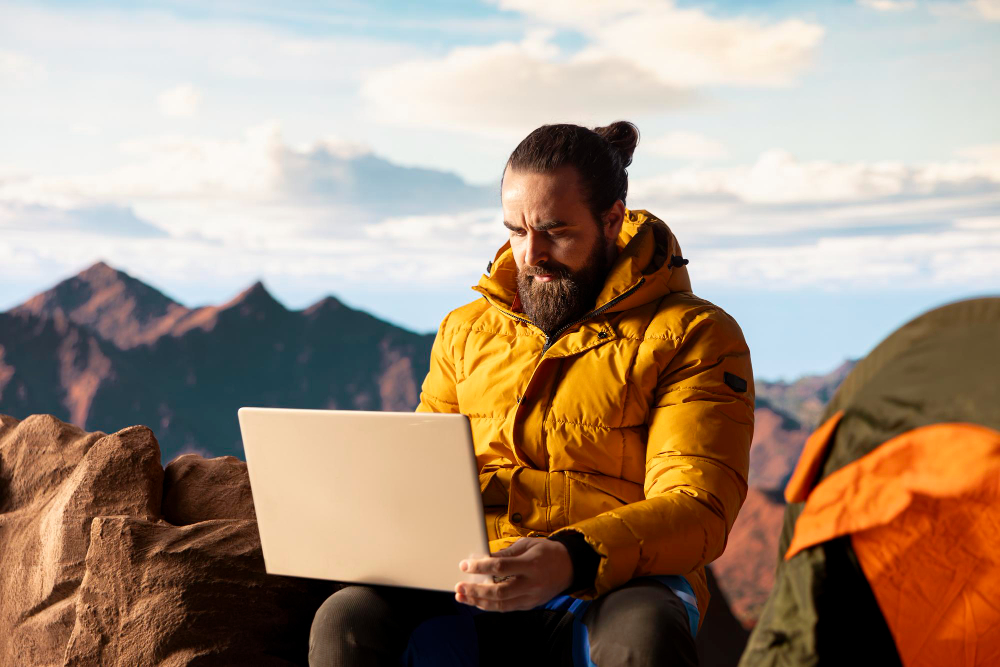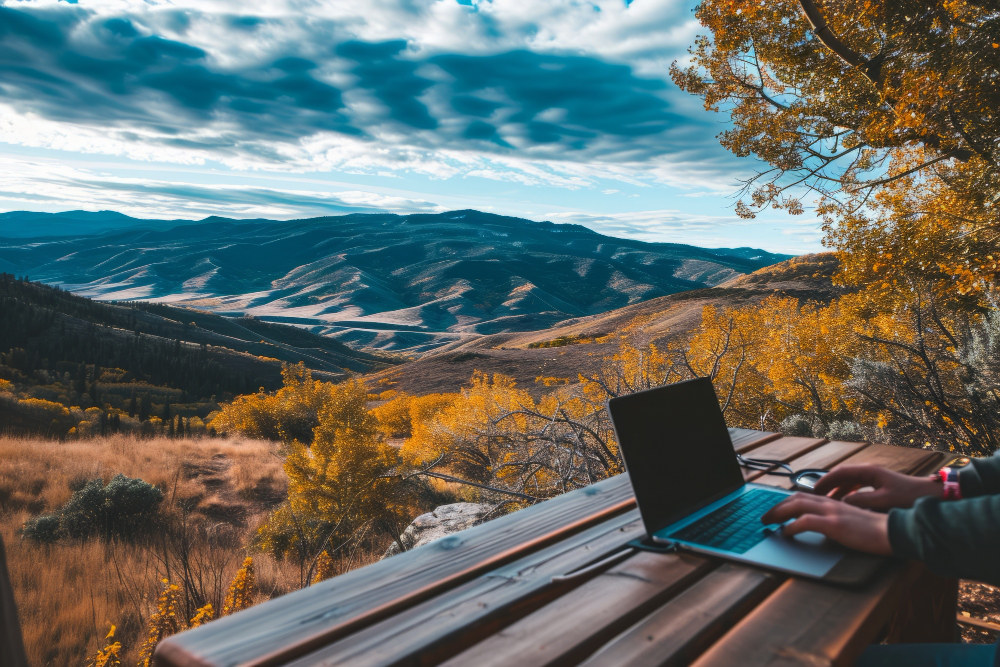I remember the first time I closed my laptop, stepped outside, and realized the Wi-Fi I had relied on so much didn’t matter nearly as much as the view. That day, I wasn’t in a trendy coworking space or sipping a latte in a busy café—I was surrounded by silence, forest, and freedom.
It was the day I realized that “off the grid” and “online” didn’t have to be opposites. And if you’ve been wondering if it’s really possible to ditch the system and still make a living as a digital nomad, yes, you can. I’ve done it. Others are doing it. And you absolutely can, too.
Now, it’s not for everyone. But if the thought of watching your energy meter tick backward thanks to solar power gives you goosebumps, or if you’re craving a lifestyle that matches your values of sustainability, simplicity, and sovereignty, then let me show you how to do it in a way that actually works.
First, What Does “Off the Grid” Really Mean for You?
The definition of “off the grid” gets thrown around a lot. For some, it means being completely invisible—no bills, no utilities, no government ID. But for most people exploring this lifestyle as a digital nomad, it’s more about living independently from public infrastructure. That means you’ll likely be off the electrical grid, possibly collecting rainwater, treating your own sewage, growing your own food—and yes, still hopping online to run your business.

That balance is key. You’re not trying to vanish from society; you’re building a life that’s more intentional and less dependent. Think remote, not disconnected. Think sustainable, not isolated.
Planning Your Off-Grid Escape
You don’t need to start with a yurt in Alaska. You can ease into this lifestyle, step by step. The first question you need to answer is: Why are you doing this?
Is it the desire to live closer to nature? A reaction to the rising cost of city life? A protest against over-consumption? Your answer will shape everything—from the gear you invest in to the compromises you’re willing to make (like keeping broadband internet but ditching the city).
Once you’ve locked in your “why,” it’s time to address the “how.”
Start by choosing where you’ll live. Will you buy land and build your own solar-powered paradise? Renovate a tiny home or van? Join an off-grid community? Make sure your setup aligns with your goals. Want to grow your own food? You’ll need space and soil. Want to stay mobile? Opt for something compact and towable.
Your Tech Lifeline: Staying Connected When You’re Off-Grid
Let’s talk real for a minute—your biggest challenge isn’t electricity or food. It’s the internet.
You can’t run a remote business without a stable connection, so plan for it. Depending on where you live, you might rely on broadband, satellite internet, or cellular data with a hotspot. Make sure you’ve got unlimited data, a cell signal booster, and a backup system. Portable routers with SIM cards can be game-changers in rural areas, and mobile Wi-Fi antennas can help pull a signal when you’re far from towers.
And don’t skimp on your power setup. Combine solar panels with a battery bank and maybe even a wind turbine. A good off-grid system can power your laptop, phone, fridge, lights, and more—just be energy-aware. LED lights, energy-efficient laptops, and turning things off when not in use make a massive difference.
Your Digital Nomad Toolkit: What to Pack for an Off-Grid Life
Here’s a list I swear by—gear that’s saved my sanity more times than I can count:
- Durable laptop or tablet: Go for a rugged model if you’re living rough. Bonus points for low power consumption.
- Portable laptop stand: You’ll thank yourself when your back doesn’t hurt.
- Hotspot device and unlimited data: Lifeline to the digital world.
- Cell signal booster: For when you’re miles from the nearest tower.
- Portable solar charger or wind turbine: To recharge your devices without the grid.
- Portable power station: Stores power from your solar panels or turbines.
- Headlamp and solar lanterns: Because nights get dark when you’re really off-grid.
- Basic toolkit: You’re your own handyman now.
- Water purifier or filter system: Stay hydrated and safe.
- Notebook and pen: For when tech fails and your ideas won’t stop flowing.
How Much Will It Cost You?
This lifestyle isn’t cheap up front, but it can save you thousands over time. Think of it as an investment in your independence.
- Solar setup with battery storage: ~$40,000
- Backup generator or turbine: $7,000–$10,000
- Well drilling: ~$7,000
- Septic system or composting toilet: ~$5,000
- Basic home or tiny home: Varies wildly—budget anywhere from $10,000 for a trailer to $100,000+ for custom builds
But don’t get scared by those numbers. Many nomads find creative ways to cut costs—buying used gear, living in converted vans, joining land-sharing co-ops, or building gradually. It’s not about perfection; it’s about progress.
Earning an Income Without Plugging Into the System
Here’s the best part: making money while living off-grid isn’t just possible—it’s often easier than you’d expect. Why? Because your overhead is lower, your distractions are fewer, and your lifestyle becomes your brand.
You can blog, consult, coach, write, design, manage projects, run e-commerce sites, teach online courses, edit videos, or manage social media accounts—all from your little patch of paradise. If you’ve got internet and a skill, you’ve got income.
Some nomads even monetize their lifestyle directly by creating content about off-grid living, offering retreats, or building eco-tourism businesses like glamping sites.
You don’t have to give up your career. You just have to redefine where it happens.
Keep Your Community Alive, Too
One myth about off-grid life is that it’s lonely. It doesn’t have to be.
Stay connected with fellow nomads, join online groups, and host your own gatherings. Invite other creatives to co-work with you. Lead yoga in the mornings and mastermind sessions in the evenings. Community doesn’t disappear just because the city does.
The Final Thought
Living off the grid as a digital nomad is about more than unplugging—it’s about reimagining. It’s not always easy, but it’s profoundly worth it. You get to live closer to your values, work in harmony with nature, and redefine success on your own terms.
So, if you’re ready to wake up with the sunrise instead of an alarm, if you dream of writing under the stars, and if you want your life to be an adventure you don’t need a vacation from, then start planning. Your off-grid life is waiting. And it’s going to be beautiful.





